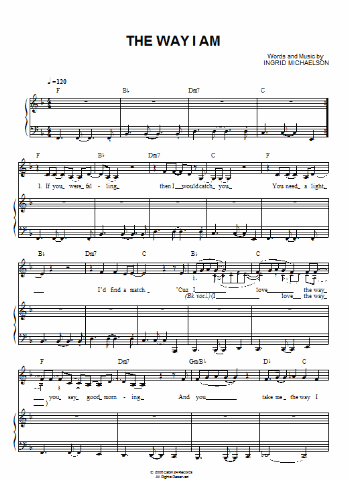
While talk of notation is in the air, it’s worth noting that sheet music has a chance to make a comeback in the digital age. After all, passive musical consumption seems to have already peaked some time in the now-past 20th Century. The desire for fans to be able to play the music they love is strong as ever, evidenced by the popularity of the Rock Band and Guitar Hero phenomenon. If you really wanted to be optimistic, you could interpret the downturn in recorded music as a positive trend back to live music and personal performance – the very musical trends that had been eclipsed by recording in the first place.
As with digital music downloads, the hope in digital sheet music is, naturally, being able to connect fans with the growing variety of music they might want to play. Brick and mortar stores where you can buy sheet music have already largely gone the way of the dodo. Here in New York, the big victim this spring is the storied classical music supply around the corner from Carnegie Hall: Joseph Patelson Music House has gone online-only. Music recording can count on some sort of transition to new formats; music publishing has to find a way to rise from the ashes of a business that’s had to deal with the invention of the Internet and records.
Selling MP3s? Try Sheet Music, Too, Says TuneCore
Last week, the latest announcement on this frontier was a partnership between TuneCore and Musicnotes.com. That brings together two real success stories in this arena. TuneCore is an affordable, flat-fee service that distributes music across different online stores (iTunes, eMusic, Amazon MP3); they’ve worked with everyone from indie artists to Areha Franklin, Beck, Bjork, and Cirque du Soleil (among others). Talk long tail: they release more music per day than any single major does in a year.
Musicnotes is interesting in that their catalog of on-demand online sheet music, topping about 100,000 titles, has been accelerating in sales – even as the economic recession takes its toll on the rest of the industry. They also boast 100,000 daily visitors to their site, thanks in part to partnerships with big-name publishers like Alfred, Faber, Disney, and Universal.
So, how do you bridge downloadable tracks with scores?
To start out with, TuneCore is skimming the top of their long tail and turning their work into scores. That means any artist starting this month with more than 25,000 track sales in the last 90 days will get at least one of those songs scored by a pro and available for download, adding score royalties to track royalties. Artists eligible include various artists who might not get sheet music published by a traditional publisher – especially given the overhead conventionally associated with that. (Names as varied as Ziggy Marley, Boxer Rebellion, and MGMT count as “eligible,” though it’s not clear who will take them up on the offer.)
At the time of the announcement last week, Gavin Mikhail, William Fitzsimmons and Ingrid Michaelson had signed up. Michaelson’s pop singer-songwriter hit “The Way I Am” is one you may have already heard; as pictured here, that hit will be among the first offerings via the partnership. (The fact that you may have heard this tune via radio play – even if it’s via a college station – suggests that the old model may transition more gradually to a new model than hyped-up Internet pundits may suggest.)
The Online Notation Frontier
Notation has managed to survive centuries, so I suspect this could be just the beginning of a convergence in digital scoring. Since Sibelius announced a new release this morning, it’s worth noting that the company has long pushed online music with its Sibelius Scorch platform, which allows you to view and play scores as if you had a copy of the software used to create it. You can publish online directly from Sibelius’ software, and the platform is even used in sales. SheetMusicDirect (US site | worldwide) combines Scorch with a huge catalog of tunes. The company’s own Sibelius Music site, which can publish scores produced in Finale as well as Sibelius, just got a big update and has an active community. Some scores are free, but some are for sale – and anyone can open their own store.
In fact, given that, one question I have about the other stores is whether a dedicated sheet music score can have the success and brand loyalty an iTunes or even Amazon MP3 might, but we’ll see. (The other big question: will your Kindle soon display sheet music?)
For its part, musicnotes.com is happy to sell you tunes for Memorial Day or graduation, plus a free copy of Old Macdonald. (Yes, that’s the guy with the farm – that Old Macdonald.) Of course, Apple for their part seem to have dropped the ball on the whole idea; there’s been a lot of discussion about the fact that their GarageBand Lessons have been too few to make any real impact. But that shouldn’t stop other outlets from getting in on the act – and musicnotes.com sells lessons alongside sheet music, a key ingredient for selling sheet mu
sic being the ability to read it.
All this change is not without some wrinkles, as noted by Iowa City New Musical Resources blogger Peter GiIlette:
Sheet Music on the Web: Trends and Trials
He notes, for instance, the irony of the Web Library of 17th Century Music forbidding commercial performance of their online scores – you know, they just want a cut of all the money you’re making on … um … 17th Century musical performance.
At the same time, it’s telling that even G. Schirmer is getting in on its own on-demand delivery system.
So, my question to you is not to debate this in theory, but ask:
Have you found useful ways to sell or freely disseminate your own scores?
Have you bought a score online?
Is there a score you would buy online if an artist made it available, or if there were better stores available?
I’m curious what practical implications there may be.
And incidentally, these lead sheets and such are great, but I would absolutely buy alternative and strange experimental notation from electronic artists if they chose to deliver it.


